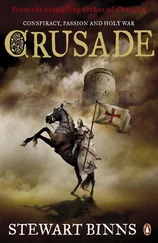Below are Harold’s parting words to me in 1176. Over the past ten years, I have replayed our final conversation in my head many times, but now I must commit it to vellum. As an old man, I have gained much comfort and solace from my memories – and especially from my memories of this remarkable man. I will see him in my mind’s eye once more as his story draws to a close.
‘So Maud and I left for Argentan in the spring of 1148. It was a great relief; we could watch our boys grow into men and live in peace. St Cirq Lapopie continued to be our secret place, and we spent many happy days there. Eadmer and Greta lived there permanently, as did Otto and Berenger when they became too old to be Maud’s bodyguards. They both married local girls and started their own families. I was proud to be part of a community at St Cirq Lapopie that was not unlike the one my grandfather had founded; that made me very happy.’
‘But surely that is not the end of your story? This is 1176, over twenty-five years later!’
‘There is nothing more for me to tell you. The rest is Henry Plantagenet’s story – and you know that as well as anyone.’
‘And thanks to you, I now know much more. Did you ever tell him that you were his father?’
‘No, I was sorely tempted – and Maud said she would be happy for me to tell him when he came of age – but I decided it was a dangerous piece of information, both for him and for England. I decided that I would remain his uncle and guardian; that sufficed. The most important thing was to watch him grow and to be his mentor.’
‘And you and Maud continued to be happy?’
‘Yes, indeed. She never returned to England. When Henry was crowned King Henry II in 1154, Maud was over fifty years old and did not want to cross the Channel. By then, we rarely went to St Cirq Lapopie; it was too far for her. She was sad not to be in Westminster Abbey, but I was there to see our son crowned and I reported back to her with every detail. By then, Henry had married the indomitable Eleanor of Aquitaine, a woman his equal in every respect and someone I am privileged to call my daughter-in-law. Thus Henry took the titles King of England, Duke of Normandy, Duke of Aquitaine and Count of Anjou.’
‘And now, Henry has added Ireland and Scotland to his empire.’
‘Yes, my grandfather always said that both Scotland and Ireland would eventually come to be ruled from Westminster. Thankfully, Henry rules wisely and I am proud that the great Anglo-Norman empire Maud and I dreamed of has come to pass. Henry’s domain extends from the Highlands of Scotland in the north to the Pyrenees in the south, and from Flanders in the east to Kerry in the west.’
‘He has been a good King.’
‘I’m pleased that you think so. I’m proud of him. Normans still dominate this land – that will last many lifetimes – but, thanks to Henry, this is a fairer land for Norman and Englishman. He has curtailed the excesses of the earls and barons, introduced courts to administer justice and fair trials by twelve lawful men, and put an end to the excesses of the Church.’
‘You lost Maud in 1167, I think.’
‘I did; we were very happy until the end. There were sad times of course – especially as we watched Henry struggle to keep his vast empire together, or when he and Eleanor squabbled. We also lost Geoffrey and little William very early: Geoffrey was only twenty-four when he died, and William just twenty-seven.
‘Maud became quite frail, but she never lost that smile – the one that could melt my heart even from her deathbed. We spent her final years in Rouen, at the Priory of Notre Dame du Pré, a foundation tied to her endowment at the Benedictine Abbey, at Bec. She found tranquillity there and spent her time caring for the sick, as well as helping the monks with their pastoral work. It was the monks of Bec who stood around her as she died, singing gently as she went to meet her Maker. As she breathed her last, she squeezed my hand and I leaned forward so that I could hear her. She whispered faintly just six words: “Our son is King of England.” I wept only briefly; it was not a moment for tormented anguish, more a time to reflect on the life of a remarkable woman.’
‘She was indeed an extraordinary woman. But she was also fortunate to have met you, Harold of Hereford. Thank you for allowing me to hear your story.’
‘You are very kind, Abbot. But it is a story that had to be told – and it could only be told to you, Gilbert Foliot. I hope it has not been too onerous.’
‘It has been a privilege; I will make sure it is written down and committed to the archives.’
‘But not in my lifetime, good Bishop, nor in the lifetime of my son.’
‘Of course not. When it is written, I will find a way of getting it into the Vatican Vaults; they have a library there that is almost a thousand years old.’
‘I am very grateful to you. But let me add a couple of things before we are done.’
‘Which are?’
‘Firstly, the inscription on Maud’s tomb: “Great by Birth, Greater by Marriage, Greatest in Her Offspring. Here lies the Daughter, Wife and Mother of Henry.” And secondly, the thing that gave her the most satisfaction at the end of her life: the name Henry often used, which was “Henry FitzEmpress”. There was no greater comfort she could have had at the end of her life.’
‘And how have you spent the years since Maud’s death?’
‘Mostly at St Cirq Lapopie – especially in the last few years, when it has been harder to travel. The estate thrives; we have a monastery and a community of over a hundred souls. My old friends have all gone now, buried in the family plot there, but their families keep me young and take care of me.’
‘That reminds me: do you want me to regard your account as your testament before God?’
‘Yes, I suppose I do – although my family has never been particularly religious.’
‘No, indeed; I remember all that Old Religion heresy and the Wodewose nonsense! But we must let God be the judge of that. As far as my authority as a Bishop of Christ extends, I will grant you absolution subject to the following penance. You are to make a pilgrimage: you must go to the tomb of St Etheldreda at Ely; she will be pleased to hear your prayers.’
I blessed Harold of Hereford and, as I did so, I remembered one small point of detail to complete the story.
‘What became of the Talisman of Truth? Did you give it to Henry?’
He put his hand into the neck of his smock and pulled out his Venetian medallion together with the fabled amulet.
‘He wore it on his early expeditions to England, before he became King. But by the time he was crowned, he already understood all it had to say to him. So now I am its guardian again.’
‘And what will you do with it? Should it not go into the Vatican Vaults where it belongs?’
‘No, Gilbert, it disappeared into the vaults of the Monastery of Monte Cassino for decades. I don’t want it lost again. Besides, it still has work to do. After I have done the penance you have been kind enough to give me, I am going to give it to a man who will be King one day; he may need it. He is only nineteen but is currently in Aquitaine, putting down revolts for his father. His exploits have already earned him a legendary name.’
‘May I ask who he is?’
‘Richard, Duke of Aquitaine, “The Lionheart”, my grandson. He and his ancient “great-uncle” are going to have a conversation about chivalry, brotherhoods and amulets.’
Thus ended my conversation with the remarkable Harold of Hereford.
He strode back across the courtyard of my Palace in Fulham, just as purposefully as when he had arrived all those weeks ago. I never saw him again, nor did I hear any reports of his death. But he must have died by now; I assume he’s buried at St Cirq Lapopie with his friends and family. Or perhaps he found a mountain eyrie, or a lair in the wildwoods, like his father and grandfather before him?
Читать дальше












